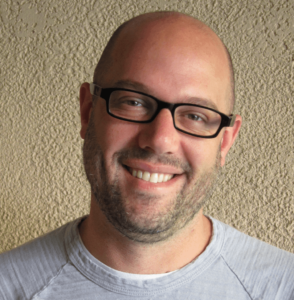SO HERE’S THE SITUATION
Writer/Producer Jamie Rhonheimer has been killing it in the situation comedy world for almost two decades. You may have heard of some of the shows he’s been staffed on, like “Will and Grace,” “How I Met Your Mother,” and most recently Netflix’s “The Ranch.” We caught up with Jamie to ask him how he keeps it going and to find out what recommendations he has for writers interested in TV and sitcom writing.
by Jim Cirile, Coverage Ink
Jim Cirile: Tell everyone a little about your background.
Jamie Rhonheimer: I’m originally from Colorado. I went to college at Syracuse University and moved out to LA right after graduation, and was fortunate enough to know exactly what I wanted to do — write sitcoms. And when you know what you want to do so clearly, the only question really is what’s the best path to get there. I had a friend who had graduated a year before me and was out here working on sitcoms, and he explained the path from breaking in as a production assistant, then moving to writer’s assistant, to writer.
JC: Did you always know you wanted to write for TV?
JR: I remember being in elementary school and we were given a survey that asked how many hours of TV we watched every day, and I (checked) the box for “8+ hours”. I think the rhythms of sitcoms are kind of ingrained in me at the deepest level, and maybe I chose this career to prove to my mom it wasn’t all a waste of time. After college I was offered a job working for an advertising agency I had interned for, and it was a really tough decision because it would’ve been in Manhattan working as a copywriter for a good agency, but I felt like I had to give this a shot. So I moved to LA, as you must, must do if you want to embark on a career as a sitcom writer, and sort of just tried to work my way in.
JC: So how exactly did you do that?
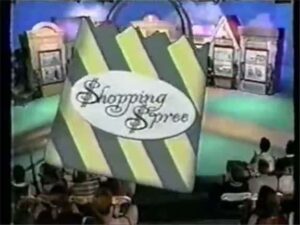 JR: I got my first PA (production assistant) job through a friend who was out here working on the CBS Radford lot and heard they needed someone. It was on a game show for Family Channel called Shopping Spree. It was very low budget; they didn’t have prizes, they had pictures of prizes, and if the contestant won the prize, then someone had to go out to Best Buy and pick it up. But it was a good experience, and the best thing about it for me was it was shot on the CBS Radford lot, which was home to major sitcoms like Seinfeld, Roseanne, even going back to Gilligan’s Island. After that, I got (another PA) job on an hour-long ABC cop show called High Incident, and then when the following spring came around, I still had my badge from CBS Radford, and I used it to sneak onto the lot and go door-to-door with resumes to all these sitcom offices.
JR: I got my first PA (production assistant) job through a friend who was out here working on the CBS Radford lot and heard they needed someone. It was on a game show for Family Channel called Shopping Spree. It was very low budget; they didn’t have prizes, they had pictures of prizes, and if the contestant won the prize, then someone had to go out to Best Buy and pick it up. But it was a good experience, and the best thing about it for me was it was shot on the CBS Radford lot, which was home to major sitcoms like Seinfeld, Roseanne, even going back to Gilligan’s Island. After that, I got (another PA) job on an hour-long ABC cop show called High Incident, and then when the following spring came around, I still had my badge from CBS Radford, and I used it to sneak onto the lot and go door-to-door with resumes to all these sitcom offices.
JC: Ha! I love it. Carpe diem.
JR: And it worked! I was able to parlay that into a PA job on an NBC sitcom called Union Square. Union Square was one of the first shows to really sully the time slot between Friends and Seinfeld. It ran for 15 episodes before it was cancelled, so that was a good work experience for me. I was able to move from that right on to the production staff of Two Guys, a Girl, and a Pizza Place, still as a PA. And all the while I was learning to be a writer’s assistant, and trying to train and shadow.
JC: Step two.
JR: Right. The following year Two Guys, a Girl, and a Pizza Place came back, but there were 5 people that were ahead of me for writer’s assistant jobs. So I was pretty aggressive again with getting my resume out, and lo and behold, someone that I had worked with at Union Square had heard about a writer’s assistant job on a new show called Brother’s Keeper on ABC. And that guy actually lied to the people at Brother’s Keeper and told them that I had been a writer’s assistant on Union Square, not a PA. So they brought me in, assuming that I had this experience, and in fact made me the head writer’s assistant, which was terrifying and definitely a trial by fire, but it worked out. 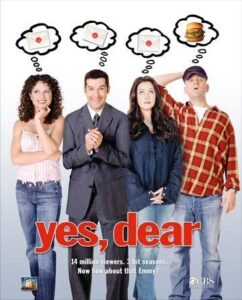 Brother’s Keeper got cancelled, so I went back out into the market and got another writer’s assistant job on Stark Raving Mad, another NBC Thursday show. And then the following year I got a writer’s assistant job on Yes, Dear. I was there that first year as a writer’s assistant and I began pitching more and more in the room. By the end of the year, I had convinced the showrunners to let me take a crack at writing an episode. So they teamed me up with another writer on staff, and we wrote what turned out to be the season one finale. The following year they brought me on to the writing staff. I was on Yes, Dear three and a half years.
Brother’s Keeper got cancelled, so I went back out into the market and got another writer’s assistant job on Stark Raving Mad, another NBC Thursday show. And then the following year I got a writer’s assistant job on Yes, Dear. I was there that first year as a writer’s assistant and I began pitching more and more in the room. By the end of the year, I had convinced the showrunners to let me take a crack at writing an episode. So they teamed me up with another writer on staff, and we wrote what turned out to be the season one finale. The following year they brought me on to the writing staff. I was on Yes, Dear three and a half years.
JC: Okay, so I’m curious — writer’s assistants are just supposed to take minutes and keep their mouths shut, right? So how does one know when it’s okay to pitch an idea?
JR: Nobody is ever looking to you. And the room is very rarely stumped. So the challenge is, when you have an idea, you almost feel like a surge of adrenaline and you just have to wait until the right moment. You just kind of wait for a spot where it’s okay to jump in and make yourself heard. Edging yourself in is a challenge, but you know the more you do it, and the more that you succeed, the more confidence you get and the easier it is to do it the next time. If you’re pitching once a week and 75% of your material is getting in, you’ll make a very positive impression. Over the course of my first writer’s assistant job at Brother’s Keeper, I pitched maybe a dozen times. And I was getting stuff into the script, but even if I hadn’t been, they were good enough jokes and ideas that I made a favorable impression. And then on Stark Raving Mad, I was pitching more like once, twice a week, and getting stuff in and doing well. By Yes, Dear, I think I had more confidence and was pitching like, a couple of times a day, maybe. And I think that’s what gave them the confidence to bring me on to the staff.
JC: You were a staff writer on Yes, Dear, but by the end you were a co-producer. How does that work in TV?
JR: I started as a staff writer, then story editor, then executive story editor, then co-producer. The way that it works is that everybody on a writing staff has a specific title, and some people have the same title, but the writing staff is made up of people on different levels and your level reflects your experience. Your first year as a sitcom writer your title will be “staff writer.” Your second year your title will be “story editor.” Your third year your title will be “executive story editor.” Then “co-producer,” then “producer” then “supervising producer” then “co-executive producer.” It’s just that simple. If your career goes cold, maybe you’ll have to take a step back in levels, or if you have to jump from one show to another you might have to stay at a level to lock down that next job, but there is no strategy based on producer levels. It’s just the title you get based on your level of experience.
JC: Tell us a little bit about Will and Grace. Must have been an incredible gig.
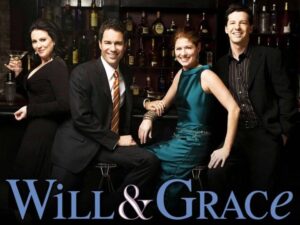 |
| Returns fall 2017 to NBC. |
JR: Absolutely. During staffing season, they were looking for new writers. They had four slots they were looking to fill, and they met with everybody in town. It was definitely a job that was sought-after. I had actually just written a spec of The Ali G Show on the advice of my agent. There’s no story in writing a spec like that, it’s just jokes and bits. And only in hindsight do I have this perspective, but I think it was great for me, because it showcased just pure jokes. And they liked it. Also, one of the showrunners had done a pilot a couple years prior that I had been the writer’s assistant on. I think I had some good second-party recommendations working in my favor. I was as surprised as anybody when I got the call. It was a great, great break for me. It was like being traded to the Yankees in the middle of their World Series years, and you’re just hoping to find some way to just make some sort of contribution. But it was a great experience for me and it definitely changed my career.
JC: And the hits just keep on coming. From there, six years on How I Met Your Mother?
 JR: When I was on Will and Grace I met a lot of great writers there. One of them was a writer named Greg Malins. It was the final year of Will and Grace, so the next year everybody went back out into the market. Greg was hired to be kind of a high-level support for Carter (Bays) and Craig (Thomas,) who had created How I Met Your Mother. Greg didn’t know anybody on the writing staff, and he wanted there to be at least one writer on the staff who he knew and trusted, and that he wanted it to be me. And I owe my entire career at How I Met Your Mother to Greg. He fought for me and made it happen for me. It was great because we started at the beginning of the second season, since the first season had been during the final season of Will and Grace. And it was a show that I watched and was a fan of, so it was such a thrill to go over there and work on it. And at that point in time going into season 2, the show wasn’t a hit, it was kind of scraping by a little bit, but we had this sort of us-against-the-world mentality, and everybody who worked on the show loved it. I got to be there for this great ride over the next six years. I was not there for the final two seasons. I had moved on at that point.
JR: When I was on Will and Grace I met a lot of great writers there. One of them was a writer named Greg Malins. It was the final year of Will and Grace, so the next year everybody went back out into the market. Greg was hired to be kind of a high-level support for Carter (Bays) and Craig (Thomas,) who had created How I Met Your Mother. Greg didn’t know anybody on the writing staff, and he wanted there to be at least one writer on the staff who he knew and trusted, and that he wanted it to be me. And I owe my entire career at How I Met Your Mother to Greg. He fought for me and made it happen for me. It was great because we started at the beginning of the second season, since the first season had been during the final season of Will and Grace. And it was a show that I watched and was a fan of, so it was such a thrill to go over there and work on it. And at that point in time going into season 2, the show wasn’t a hit, it was kind of scraping by a little bit, but we had this sort of us-against-the-world mentality, and everybody who worked on the show loved it. I got to be there for this great ride over the next six years. I was not there for the final two seasons. I had moved on at that point.
JC: The series finale was a bit controversial.
JR: It was something we talked about as early as season two, because we knew that we needed to shoot the children before they got older. That was shot during season two, so we always knew what the ending was, and I think it was the right ending for the show. I understand why audiences were a little bit polarized on it, but in my mind it was absolutely the right ending for the show.
JC: Jumping ahead to the present, how did you get The Ranch?
JR: I met with the showrunners, Jim Patterson and Don Reo, and we had a great meeting. I had a few different connections to Jim. One is through one of my best friends – a guy I’ve been friends with since junior high. He’s a writer out here who has worked with Jim and gave me a nice recommendation. And two years before, I had worked on a show called Bad Teacher. The showrunner, Hillary Winston, had worked with Jim as well, so both of those people gave me nice recommendations. We had a good meeting and they took a chance. I’ve been here for the whole run. It’s really cool. Working for Netflix is every bit as great as advertised.
JC: They have a reputation as being creator-friendly.
JR: They are very hands-off and let the showrunners make the show they want to make. On a typical network show you’re submitting to a production company, a studio and a network, for every episode, a two-page story document, then a six-to-eight-page outline and then a fifty-page draft of a script. Each one of those entities at each step of that process gives notes. So there is constantly work to be done in terms of addressing the notes. Netflix asks for none of that. When Netflix comes to a table read, it’s the first time they’re learning anything about an episode.
JC: Nice.
JR: There’s a lot of trust, and it’s really great because it allows us to do what we want to do, trust our gut, and follow our visions. Working for Netflix is great. For a typical network show, you’re delivering about twenty-two minutes, and with Netflix they’ve told us the sweet spot is between twenty-six minutes and thirty-two. There is the luxury of telling a story a little more slowly. When you find a cool dynamic or a cool moment you can hang out there a little longer than you can on a network show.  JC: Even the best network sitcoms sometimes feel rushed or condensed. The beauty of The Ranch is that it flows so much better. That model almost feels like Sitcom 2.0.
JC: Even the best network sitcoms sometimes feel rushed or condensed. The beauty of The Ranch is that it flows so much better. That model almost feels like Sitcom 2.0.
JR: I totally agree. Having more time allows you to go to deeper dramatic places. Also, because it’s Netflix, there’s an emphasis on serialization. Netflix wants a show where at the end of an episode you’re dying to know what happens next. It’s not like a typical network sitcom where every episode starts and ends with the characters in the same place. In our show, things are constantly evolving and changing for our characters. New challenges come up. We’re looking for, not cliffhangers per se, but moments of drama that make people want to immediately click into the next episode. Everybody on our writing staff comes from network TV, so we’re using the same muscles, but we’re getting to stretch them in new, challenging ways.
JC: How do you plan out the show arc on The Ranch?
JR: At the beginning of each season we talk about big picture ideas, things we want to do that year. Netflix orders twenty episodes at a time and is dropping ten at a time, so we’re sort of looking at them in 10-episode chunks. So for each ten episodes we’re talking about places we want to get to by the end of the ten. We’re currently starting production today on episode 36 of 40. Of the 10-episode chunks within that, twice we’ve had a goal in mind and gotten there. The other time we had a goal in mind and we just sort of felt there were a lot more stories to tell on the way, so where we thought we were going changed. I think you have a goal in mind and you develop toward it, but you also want to be flexible and have an eye toward what’s working. If there’s something that’s working and you discover there is more to say or tell along the way, it’s good to have the flexibility to change the plan. 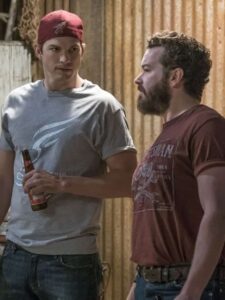
JC: How are scripts and credit doled out to the writing staff?
JR: On this show, everything is done as a group. On a typical show, individual writers are assigned individual episodes, and they go off and write the story outline and script and then bring it back to the writing staff, and then it’s written by the group. On this show, stories are broken by the group, which is typical, but then a smaller group will be assigned to go off and write it in a smaller writer’s room. The smaller group generates the draft. The showrunners might give a few rounds of notes to get it into shape, and then, before it goes into production, the showrunners decide who will get credit on the episode. It’s such a collaboration on this show that it’s hard to pick apart anybody’s individual contribution besides a joke here or there.
JC: Do you feel it’s important to always be creating your own material, especially when working on someone else’s project?
JR: I’m not happy unless I have a (personal) project that I’m working on. It’s therapeutic for me to write. I typically find that when I finish a pilot or screenplay or something, I always find myself immediately thinking about what I’m going to write next. On the most basic level, I write because if I’m not writing, then I’m not happy and I feel like I’m wasting time. On a business level, I’ve reached the point in my career where I’m well-known enough in sitcom writing circles that the importance of my samples is less now than it used to be. So as a staffing tool I don’t need to be writing new samples. But my goal remains to get my own show on the air, and it’s very important to be always generating new material.
JC: Is it hard to find time to work on your own projects?
 |
| Rhonheimer also worked on this 2012 show. |
JR: The challenge is, when I get home, to find the energy to shift gears and work on my own stuff. And I feel like that challenge dates back to when I was a PA, because as a PA the only way to ever advance is to be working on your own stuff. And it’ll never be harder than it was then, because those were 12 or 14-hour days. I’ll never complain about having a steady job though. It’s tough because for me it means going home, maybe taking a hot shower, taking the dog for a walk, something mindless that lets me do some mental housekeeping, just releasing the day and giving myself a mental break, then I can come back and attack fresh. And the longer the day, the harder that is to do. I always feel like, if I’m in a writing groove, then everything else comes second, including sleep. Whatever you’re working on in your free time is typically something you’re passionate about, so shifting gears and working on that can be invigorating.
JC: Jamie, a million thanks for your time and so many yuks. Any advice for our readers interested in TV comedy writing?
JR: Get a job as a PA on whatever kind of show you want to write. The best way to learn, in my opinion, is by working on one of those shows. Working your way from PA to writer’s assistant and seeing the process from inside is incredibly valuable. For a lot of people that’s not realistic, and I get that. So in terms of developing your comedy chops, take improv classes. Put yourself in a position where you have to think on your feet. Hopefully you can grow those muscles a bit. The key is to put yourself in situations where you can learn firsthand. It’s hard to just sit down and be funny, so the more time you can spend surrounded by people in comedy, the better off you’ll be.
+++

